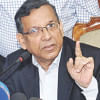When will impunity for crimes against journalists end?

On November 2, 2022, as the world observes the International Day to End Impunity for Crimes against Journalists for the ninth year, it's only proper to remind our readers a sad but glaring fact about how Bangladesh is doing in this regard. Just two days before, a Dhaka court, for the 93rd time, granted the Rapid Action Battalion's (Rab) request for more time to complete their investigation into the killings of journalist couple Sagar-Runi. Though no one should ever foretell any judicial action, in this case, people's presumption that the investigating official would certainly hit a century in seeking time extensions should be forgiven.
It is also the 10th anniversary of the UN Plan of Action on the Safety of Journalists and the Issue of Impunity. Ironically, more than 10 years have passed since those ghastly double murders took place on February 11, 2012. It's not just the murders of Sagar Sarowar and Meherun Runi that remain unsolved; according to the Unesco Observatory of Killed Journalists, there are 13 unresolved cases of murdered journalists in Bangladesh. The observatory statistics lists a total of 26 journalists killed between 2004 and July 2022.
Even worse is the government's inaction and disregard to engage and cooperate with international organisations on the issue of ending this impunity. A summary of the Unesco director-general's report, published marking the day, shows that the UN body sought information from 65 countries, and Bangladesh is among the 23 non-responsive ones. It didn't even acknowledge receiving the requests about 13 unsolved cases of journalist murder. The Unesco Observatory lists show four new entries, two each for the years 2021 and 2022, of journalists killed in Bangladesh. All these four victims were local journalists.
Another disturbing fact is that, since 2016, the proportion of journalist killings have been on the rise in countries that are not in armed conflicts. Another data that should worry us more is that the situation is the worst in the Asia Pacific region – almost 42 percent of journalist killings registered worldwide occurred in this part of the globe. In its report, Unesco says that, in the past, TV journalists were the top targets, but with the changing nature of journalism, journalists working for cross-platforms have become the most vulnerable.

The latest two victims in Bangladesh were local journalists, too, and they were working on local stories. Hashibur Rahaman Rubel was the acting editor of Dainik Kushtiar Khabar, whose decomposed body was found in Kumarkhali upazila, Kushtia on July 7, a day after he disappeared. His family and colleagues alleged that had the law enforcement agencies acted immediately after his missing report was filed, he could have been recovered alive. The other victim was Mohiuddin Sarkar Nayem, a reporter for the local newspaper Dainik Cumillar Dak in Cumilla district. Reports suggest that narcotics dealers shot and killed Nayeem as he had unveiled their narcotics trafficking business.
There's little doubt that the alleged perpetrators of these killings have taken advantage of the existing intimidating environment for free media and journalism, and the history of impunity in attacking journalists. Reports compiled by various rights groups, including Reporters Sans Frontier (RSF), Committee to Protect Journalists (CPJ), and International Press Institute (IPI), have consistently shown that violence against working journalists shot up alarmingly during the pandemic. Continued weakening of democratic institutions and the increasing tendency of authoritarianism have also contributed to creating a culture of fear in the media industry. Introduction of draconian regulations such as the Digital Security Act (DSA) and their widespread abuse have caused immense suffering for the freedom-loving professional journalists. The Global Press Freedom Index, compiled by the RSF in association with Unesco, ranks Bangladesh 162nd among the 180 countries it assessed.
The Impunity Index 2021, prepared by the CPJ, however, showed one notch improvement for Bangladesh "due to convictions in February in the 2015 murders of secular blogger Avijit Roy and his publisher Faisal Arefin Dipan." Since then, there has been no visible progress in any other cases of journalist murder. There's allegations of political motives, too, from some critics, including Avijit's wife, about the trial. Understandably, expediting trials of the murdered bloggers helps build a secular profile of the ruling party and the government. Similar emphasis on trying the killers of journalists is clearly not in their mind. Hence, a perception has emerged that violence against journalists and the press does not count as a crime in Bangladesh.
Polarisation and divisions within the media industry have also made things difficult; as a result, justice remains elusive in Bangladesh. We can only hope that when there is a democratic revival, rule of law will return and that will bring an end to the impunity for the crimes against journalists in this country.
Kamal Ahmed is an independent journalist. His Twitter handle is @ahmedka1


 For all latest news, follow The Daily Star's Google News channel.
For all latest news, follow The Daily Star's Google News channel. 










Comments